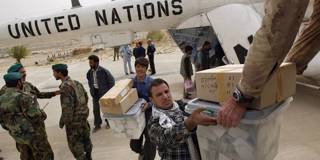There are plenty of reasons to be deeply skeptical about the Taliban, but working with them may be the only way to prevent further violence and head off a humanitarian disaster. And here, the United Nations has a critical role to play.
WASHINGTON, DC – After the United Nations General Assembly meeting in New York last month, the UN is being asked to take on an outsize role in Afghanistan. The Taliban are eagerly seeking international legitimacy, and global and regional powers should extend it – but only when certain political and humanitarian conditions are met, in line with recent official statements and UN Security Council resolutions on Afghanistan.

WASHINGTON, DC – After the United Nations General Assembly meeting in New York last month, the UN is being asked to take on an outsize role in Afghanistan. The Taliban are eagerly seeking international legitimacy, and global and regional powers should extend it – but only when certain political and humanitarian conditions are met, in line with recent official statements and UN Security Council resolutions on Afghanistan.